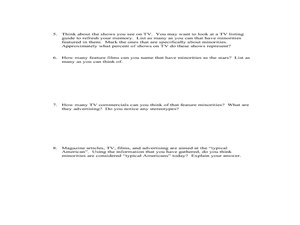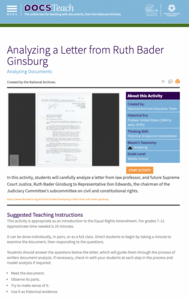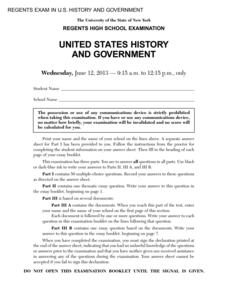Curated OER
Understanding and Applying the Miranda Decision
Students explore Miranda v. Arizona. In this U.S. Supreme Court lesson, students examine primary sources from the trial and watch the provided QuickTime videos to examine the case as well as the court's decision regarding it.
Curated OER
Introduction to the History of the Michigan Supreme Court
Students identify the players, events and changes in the history of the Supreme Court of Michigan. They explain the purpose of the Court in state government. They summarize the role and purpose of the Court.
Curated OER
History of the Michigan Supreme Court from the Territorial Court and the founding of the Michigan Supreme Court in 1836 to Justice Mary S. Coleman and her interpretation of "One Court of Justice"
High schoolers trace the history of the Michigan Supreme Court from when the state was still a territory. They define procedures as they relate to the Court. They compare and contrast the territorial court to the new Court.
Curated OER
Supreme Court Newspaper
Students examine the purpose and responsibilities of the Supreme Court and its justices. In groups, they research a specific case and identify how the Supreme Court affects their lives. Using the information they find, they create a...
Curated OER
What Do You Know? Supreme Court Nominations
Students discuss what they believe Supreme Court Justices should do while in office. As a class, they brainstorm a list of their prior knowledge about the justices and Supreme Court. In their journal, they write about the qualities of...
Curated OER
History of Supreme Court
Students study the role of the U.S. Supreme Court in U.S. history. They explore current events about the U.S. Constitution and discuss the Marbury v. Madison case from 1803. They identify the term "judicial review" and judicial...
Curated OER
The "Big Four" of the Michigan Supreme Court
High schoolers identify the justices on the Michigan Supreme Court known as the "Big Four". They relate to them by researching their lives. They participate in an activity in which they practice their investigation and presentation skills.
Curated OER
John G. Roberts, Jr. -- Nominee, Chief Justice of the U.S. Supreme Court
Students examine the life and work of John G. Roberts, the nominee to be the Chief Justice of the Supreme Court. In groups, they use the internet to define the role of the Chief Justice and complete handouts to record their information....
Curated OER
US Government: Supreme Court
Students explore the powers of the Supreme Court. In this Judicial Branch lesson, students define vocabulary regarding the branch's responsibilities, take notes on a video regarding the branch, and discuss the powers of the branch in a...
Judicial Learning Center
Article III and the Courts
What's the best way to make sense of the Constitution? A helpful lesson contains both the text of Article III and annotation of each of its sections, breaking it down into easy-to-understand parts. It also includes links to a...
Curated OER
Minorities in Mainstream American Society
So many people fought for Civil Rights in the United States. Read about the Civil Rights Act of 1964, and discuss what the act guarantees. Then pass out a slew of magazines and encourage them to observe how often minorities appear in...
PBS
Understanding and Applying the Miranda Decision
How does the Supreme Court Miranda decision affect court cases? Scholars watch a video about the decision, discuss its application in various cases, fill out multiple handouts, and work in groups to better understand how much weight the...
PBS
Explicit and Implicit Language – Interpreting the Meaning of the Fourteenth Amendment
How do Supreme Court justices interpret amendments to the Constitution? The resource helps answer that question by discussing how people use explicit and implicit language to interpret the meaning of the Fourteenth Amendment. Learners...
K20 LEARN
Worcester v. Georgia: Cherokee Sovereignty and Actions of the U.S. Government
Young historians study the Supreme Court case "Worcester v. Georgia" and note instances where the Justices defended the sovereign rights of the Cherokee. They also examine the actions of President Andrew Jackson and the...
DocsTeach
Analyzing a Letter from Ruth Bader Ginsburg
Before her career as a Supreme Court Justice, the Notorious RBG was a legal activist for women's rights. Using a letter from then-Professor Ginsburg, young historians carefully examine a letter from Ginsburg to a member of Congress...
Newseum
You Can't Say That in School? The Case of Lee v. Weisman
The Supreme Court case Lee v. Weisman is the focus of a lesson that examines religion in public schools. After reading a summary of the case and before reading the verdict, pupils use their knowledge of the First Amendment to discuss the...
Carolina K-12
Minnesota v. White: Exploring a Judicial Candidate’s First Amendment Rights
After watching a documentary on the Supreme Court case Republican Party of Minnesota v. White, class members research how the First Amendment and free speech issues influence judicial elections and then conduct a mock judicial election.
New York State Education Department
US History and Government Examination: June 2013
How successful has American foreign policy been in the past? Pupils consider the question as part of a state examination in American history. Other prompts include a document analysis and essay of important civil rights cases decided by...
Teaching Tolerance
Using Photographs to Teach Social Justice | Confronting Unjust Practices
A powerful photograph of the Freedom Riders of 1961 launches an examination of the de jure and de facto injustices that the civil rights movement of the 1950s and 1960s addressed. Young historians first watch a video and read the Supreme...
Constitutional Rights Foundation
Prayer and Friday Night Lights? An Establishment Clause Case from Texas
Is a Christian prayer before a Friday night football game a nice gesture or the imposition of religion on the rest of the community? A resource asks the question using a clip from the popular movie "Friday Night Lights" and readings...
Newseum
Compare Coverage of Brown v. Board Ruling
Young journalists analyze how The Topeka State Journal, the Jackson Daily News, and The Providence Journal reported on the 1954 Supreme Court decision in Brown v Board of Education. Scholars scrutinize the headlines, photographs,...
Curated OER
Choosing Supreme Court Justices in 2005
Students explore the process of choosing a Supreme Court judge and the impact that a nominee's views can have on the bench. They study the events surrounding each current judges nomination and the effect they had on the court.
Carolina K-12
Preventing Voter Fraud or Encouraging Voter Suppression?
The issues of voter fraud and voter suppression are relevant in every election, local as well as national. Soon-to-be voters learn about a recent bill proposed in North Carolina, the Voter Information and Verification Act, and...
Carolina K-12
Sample Test: The Judicial System
From Marbury v. Madison and original jurisdiction to Gideon v. Wainwright and civil appeal, here is a simple and comprehensive assessment on the judicial system of the United States.
Other popular searches
- Supreme Court Cases
- Supreme Court Case Studies
- Supreme Court Justices
- The Supreme Court
- Landmark Supreme Court Cases
- Supreme Court Decisions
- Supreme Court Rulings
- Corporations Supreme Court
- Writing Lesson Supreme Court
- Michigan Supreme Court
- Supreme Court Nominations
- Famous Supreme Court Cases























